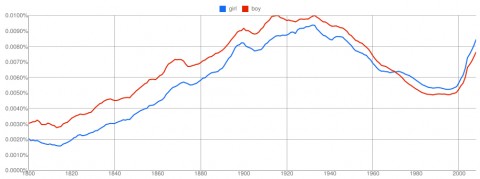Here’s an Ngram Faceoff between girl (blue) and boy (red) in English from 1800 to 2008. Further evidence of the end of men? (Click the chart to get a larger version.)

20 thoughts on “Ngram Faceoff: Girl and boy”
Comments are closed.
Here’s an Ngram Faceoff between girl (blue) and boy (red) in English from 1800 to 2008. Further evidence of the end of men? (Click the chart to get a larger version.)

Comments are closed.
Try doing it with the search terms capitalized, and you get a completely different chart. How odd. I wonder if there’s a way to make it non-case-sensitive.
@Julie — When the terms are capitalized, the sample is ten times smaller.
If you try it with men vs. women, you also get an interesting graph: http://bit.ly/fFp9ms.
Note that ‘man or men’ is mentioned 8/9 times more than ‘woman or women’ in the 1800-1900 period.
After that, it changes from twice as much around 1990 with the exception of ‘women’ which is briefly mentioned more than the others during the 1990-2000 period.
How about switching the order of the search terms, so that ‘boy’ is Blue, and ‘girl’ is Red ( which is closer to Pink. )
He vs. She yields a more interesting result.
Hmmm…took long enough!
All four of these terms at the same time: ‘boy,girl,man,woman’ provide an interesting four-trace graph.
@maarten — What confounds the man results a bit is that “man” has more meanings, and therefore more uses, that “woman.” For instance, especially in older times, “man” often meant “mankind.” What’s more, “man” can be a verb — as in “man the barricades.” Of course, that more robust use is itself telling.
@Jim — He, she is here: http://bit.ly/fKy6KI
@Andy — Very interesting. Boy, girl, man, woman is here: http://bit.ly/dXLxca
All — Male, female is equally interesting: http://bit.ly/e6y0k4
dog vs cat.
Cat has always been less popular but shows slow,continual growth over the last 200 years. Dog hit a low in 1980, but since 2000 has clearly broken out.
I checked dog and cat too. Seems like men and dogs had a low period in the Martha Stewart years.
I also checked guy and doll. Doll has a pretty strong showing in the 30’s and 40’s, but thankfully has dropped precipitously since then.
I tried babe – but I couldn’t think of a counterpart.
Okay, nerds that we are — reality check:
search for “statistics” and “meaning”
Got an interesting result using “boy,girl,Boy,Girl”
Got an interesting result using “boy,girl,Boy,Girl” http://bit.ly/hg0L7D
Hey, I have also checked a few words. Among them, “I, You, We, They, He, She, It” and the Ivy League schools. You might draw some insightful conclusions out of these charts. Link is here
http://zewsays.tumblr.com/post/2520074865/ive-found-a-new-toy
I thought it would be interesting to look at the use of communication words: conversation, dialogue, talk, chat, discussion, debate and social networking – http://goo.gl/xVBZd
It seems despite the huge popularity of social media, social networking has some way to catch up!
If you then filter for British English and then American English the results are quite different
British English: discussion leads then talk, debate, conversation, dialogue, chat [http://goo.gl/LIOdz]
American English: talk leads then discussion, conversation, debate, dialogue, chat [http://goo.gl/ixnhT]
Tried “heaven,hell”– what’s not so interesting is that “heaven” was heavily used in 1800, compared to the rarely mentioned “hell.” However, by 2000– equal usage.
Also tracked the popularity (or lack thereof) of my name. 2000 was the all-time high for literary Rachels… Whereas the husband’s “John” is back where it started in 1800 after high 20th century traffic.
Thanks, Dan!
Take a look at sir / madam
http://tiny.cc/q4i08
I loved these graphs the minute I saw your first post. Since I’m a science teacher, I had to do “science and religion” since 1900. I can’t post the graph here, but maybe you can do it and show it. It’s pretty neat!
lol … orange beats apple beats microsoft. In company brand name value it might be reverse order …